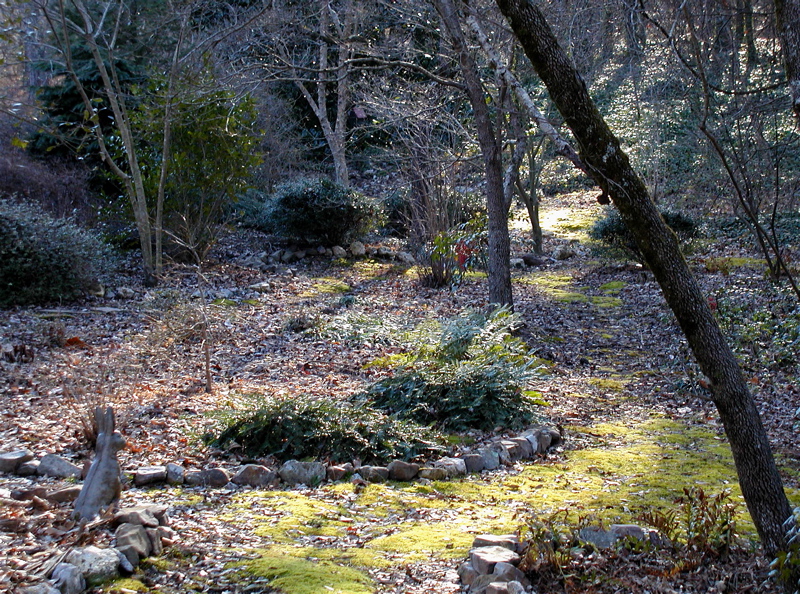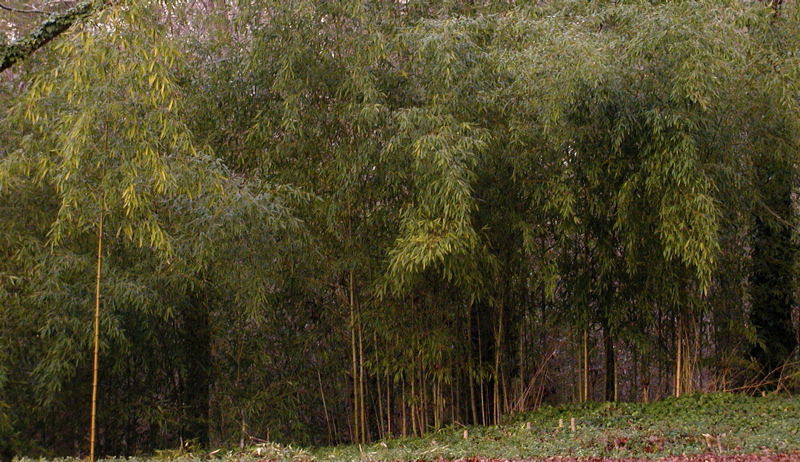Waging War with Invasives
 Tuesday, March 9, 2010 at 9:56PM
Tuesday, March 9, 2010 at 9:56PM I have been pulling weeds this week, because with all the rain and warmer weather, they are trying to take over the world. It is a battle. I once read that a weed is any plant in the wrong place. That's a liberal definition, but it goes to the heart of the matter. I may pull out a plant that doesn't belong in my garden, but probably there is some place on earth that would welcome the specimen. It is all about context.
For example: Most folks consider dandelion a weed. But in a rural setting, perhaps beneath old apple trees, wouldn't a field of dandelions be gorgeous? Wild violets and oxalis are welcome in my natural garden, but they might be out of place in someone's formal rose bed.
Could this oxalis be a weed?Moss is considered a weed in many places. Moss? I love moss, and I treasure the moss paths in my woodland garden:
 Morning light shines across the moss path in the woodland garden.
Morning light shines across the moss path in the woodland garden.
There are some weeds that don't belong near my garden, but that is my opinion and not theirs. These are weeds that burn or sting or cause itching and blisters. Or invasive weeds that are so out of control they strangle everything in their paths.
Unfortunately, for years we have been fighting battles against several invasive plants. The lady who built my house almost sixty years ago loved English ivy and put a few sprigs out here and there, according to her grandson. That ivy has taken over a good section of the woods, where it climbs high into the trees and smothers everything on the ground. I have no hope of winning the battle in the woods, though sometimes Lou goes out with a machete and cuts it from around the base of trees. But I have drawn a line where my woodland garden begins.
Not one inch farther. You stop here.
I chop it and spray it, but if I turn my back it will grab me by the ankles and pull me under. English ivy is mean stuff. I have heard that vinca is invasive. Vinca major once grew as a ground cover in a section of the woods, beneath dogwood and pine trees and a huge magnolia, and I always thought its starry blue flowers in the spring were delightful. No more. I woke up one spring morning a few years ago and realized the ivy had conquered the vinca. So I know who the real bully is.
On the other side of my house, on a steep slope overlooking a valley, I have another invasive plant growing, perhaps the South's most notorious weed. That is kudzu. Kudzu was imported from Japan and was widely planted in the southeastern USA in the 1930s and 1940s to fight soil erosion. It did a good job, and it now turns forests, old buildings, and telephone poles into giant fanciful topiaries. Every year Lou cuts back the kudzu, and we keep a careful eye on it.
We won't win, unless we spray the whole place with agent orange or else bulldoze it and cover it over with concrete. (Is that winning?) The ivy and the kudzu wait for our demise. If my house were abandoned, the ivy would come from one direction and the kudzu from the other, and the two would meet on the roof to wage war for control.
A third invasive plant grows behind the house, on the other side of a large gravel parking court. This is bamboo: Look closely and you can see stumps where Lou has cut back the bamboo. The ground cover beneath it is English ivy, which strangely does not climb the bamboo.Bamboo is a grass, and it is a pretty monster. Biltmore Estate in North Carolina has a bamboo grove along a picturesque stream. The bamboo has room to spread, and it is lovely in its setting. My bamboo wants to sprout in the vegetable garden and beneath cars in the parking area, and this is another chore for Lou and his machete. I can see the bamboo one day reaching into the broken windows of our dilapidated house, while the kudzu and ivy snarl overhead.
Look closely and you can see stumps where Lou has cut back the bamboo. The ground cover beneath it is English ivy, which strangely does not climb the bamboo.Bamboo is a grass, and it is a pretty monster. Biltmore Estate in North Carolina has a bamboo grove along a picturesque stream. The bamboo has room to spread, and it is lovely in its setting. My bamboo wants to sprout in the vegetable garden and beneath cars in the parking area, and this is another chore for Lou and his machete. I can see the bamboo one day reaching into the broken windows of our dilapidated house, while the kudzu and ivy snarl overhead.
But not today. For now I have a sturdy house and a garden of delights. There is one plant that spreads each year that is not a weed at all. Though they are not yet in full bloom, I paused from battling weeds long enough to take photos. A thousand yellow daffodils, dancing in the light:
Ten days till spring!
You may also like Weed War and Weed War: part two.
 English ivy,
English ivy,  bamboo,
bamboo,  invasive plants,
invasive plants,  kudzu,
kudzu,  weeds,
weeds,  woodland garden in
woodland garden in  garden chores,
garden chores,  plants
plants 